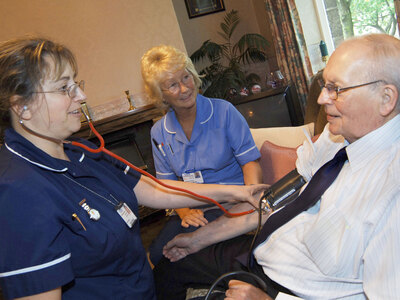10,000 signatures reached
To: The Goverment, and NHS England
Save Our District Nursing Services
.jpg)
Answer and address the fact that;
The number of district nurses – specially qualified staff trained to deliver care in people's homes, described as the “glue” of the entire community care system – has nearly halved in England over the past decade.
Now research carried out by the RCN has revealed that more than a third of district nurses are over 50 and coming up to retirement age, while local health commissioners are failing to bring through enough new recruits.
There were more than 12,600 district nurses in 2003, this number has plummeted to less than 6,700 in 2013.
The number of district nurses – specially qualified staff trained to deliver care in people's homes, described as the “glue” of the entire community care system – has nearly halved in England over the past decade.
Now research carried out by the RCN has revealed that more than a third of district nurses are over 50 and coming up to retirement age, while local health commissioners are failing to bring through enough new recruits.
There were more than 12,600 district nurses in 2003, this number has plummeted to less than 6,700 in 2013.
Why is this important?
The shortage comes despite longstanding commitments from the Government to hugely expand the scope of care in the home and community – a reform which is seen as crucial if the NHS is to survive into the next century, as the population ages and the number of people living with long-term health conditions such as diabetes, dementia and Parkinson's grows.
District nurses can also play a key role in end of life care, ensuring that patients are able to die at home with their families. But the service is now seriously over-stretched, the RCN said, with many district nurses seeing more than 12 patients in a single day and, in rural areas, often driving up to 70 miles per shift.
A lack of any district nurses would not mean the end of home care visits, but would lead a serious disintegration of the community care system, the RCN said, which often requires many different organisations and individuals – including GPs, healthcare assistants and social workers – to operate in tandem, often with a district nurse serving as de facto manager.
Dr Peter Carter, general secretary of the RCN, said that district nurses were the “foundation of a system which should be able to manage conditions and keep sick and frail people at home”.
“Remove those foundations and the whole edifice could come crashing down,” he said. “The NHS and the people who run it, have long paid lip service to the ideal of moving care closer to home. But many people up and down the country are still in need of expert care from district nurses.”
District nurses can also play a key role in end of life care, ensuring that patients are able to die at home with their families. But the service is now seriously over-stretched, the RCN said, with many district nurses seeing more than 12 patients in a single day and, in rural areas, often driving up to 70 miles per shift.
A lack of any district nurses would not mean the end of home care visits, but would lead a serious disintegration of the community care system, the RCN said, which often requires many different organisations and individuals – including GPs, healthcare assistants and social workers – to operate in tandem, often with a district nurse serving as de facto manager.
Dr Peter Carter, general secretary of the RCN, said that district nurses were the “foundation of a system which should be able to manage conditions and keep sick and frail people at home”.
“Remove those foundations and the whole edifice could come crashing down,” he said. “The NHS and the people who run it, have long paid lip service to the ideal of moving care closer to home. But many people up and down the country are still in need of expert care from district nurses.”
